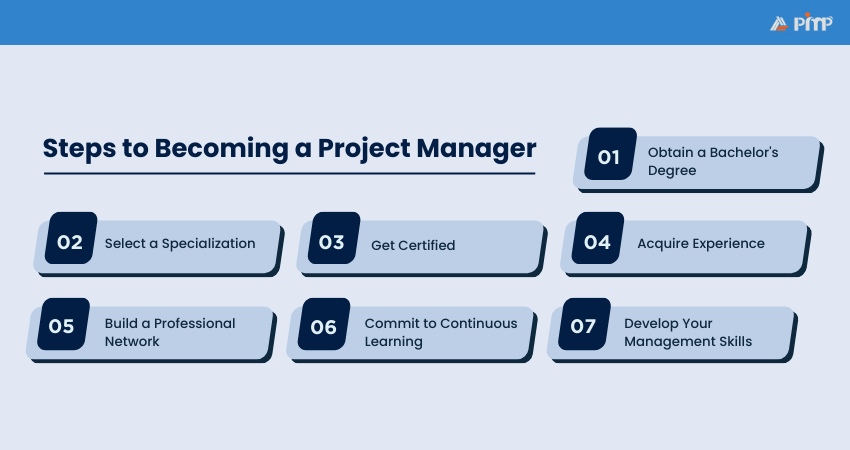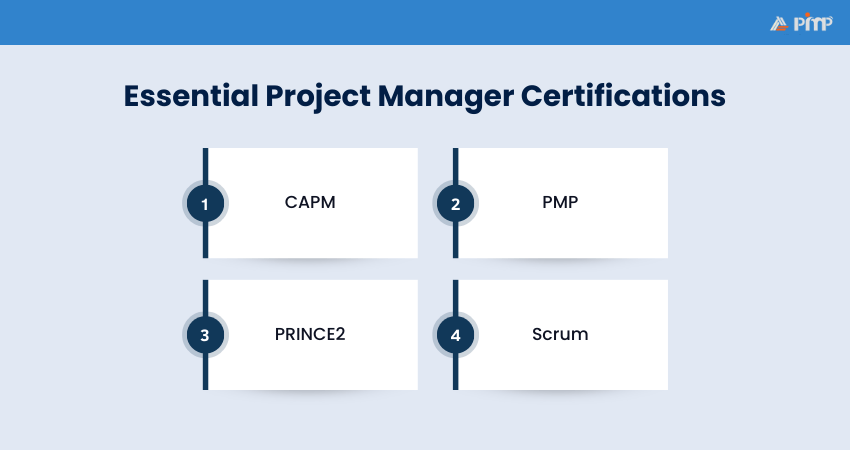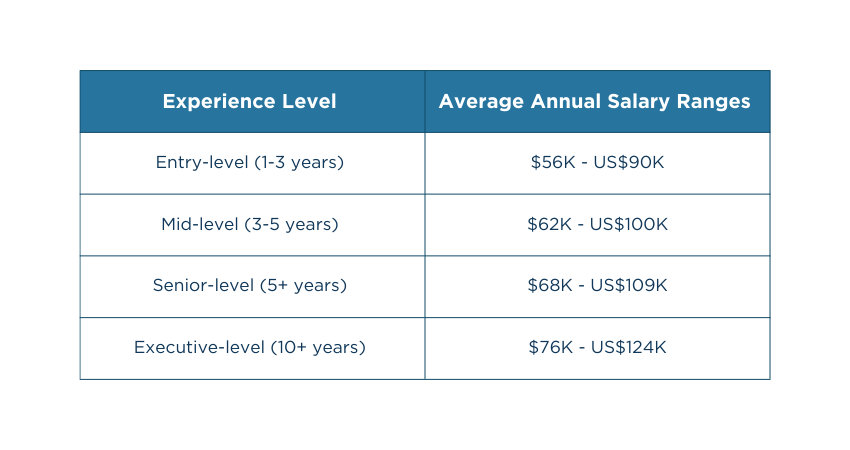







 10 Sep 2024
10 Sep 2024



Have you ever been asked to organize work, meet deadlines, or keep teams on track? Well, many times, people are asked to step into the Project Manager role without realizing it. If you enjoy planning, solving problems, and bringing people together to accomplish shared goals, learning How to Become a Project Manager may be worth exploring further.
From learning key skills to selecting the right qualifications, this blog will provide you with the roadmap on How to Become a Project Manager. So, if you are ready to build a career of growth and impact, keep reading!
A Project Manager is a professional responsible for leading projects from start to finish. The role involves covering planning, execution, monitoring, and closure. They ensure project goals are met within key constraints, such as time, budget, and scope. Creating clear plans and regularly tracking progress, Project Managers help teams to deliver efficient results.
Project Managers work closely with stakeholders, manage risks, and provide regular updates to the project. They play an integral role in aligning project outcomes with organizational goals to deliver real business value. Through strong coordination, decision-making, and leadership, they deliver projects successfully across industries.
To understand How to Become a Project Manager, one has to undergo some formal training, acquire experience, and keep on learning. Here are some key steps to guide you on your journey:

A bachelor’s degree is not mandatory, but it helps to build a strong foundation for a Project Management career. Degrees in Project Management, business, or related fields are common. For specialized industries, such as IT or healthcare, a degree in that sector is preferable. Also, having a degree makes it easier to qualify for recognized certifications.
Some Project Managers are generalists, adept at handling different projects in different industries. But many prefer to specialize in areas such as construction, real estate, IT, sustainability, and transport. Specializing helps to build deeper expertise and allows you to manage specific projects efficiently.
Obtaining a Project Management Certification may differ from other candidates and may be required in some Project Manager roles. There are various certifications, such as Certified Associate in Project Management (CAPM) and Project Management Professional (PMP), both offered by the Project Management Institute (PMI).
It is important to gain work experience to prepare yourself to be a Project Manager. Once you have chosen your desired field, look for entry-level roles that give you the opportunity to handle tasks within that field. These roles will help you understand real project challenges and workflows, leading to improved confidence and decision-making skills.
Networking is crucial for Project Managers for several reasons. It can help you find mentors who assist in skill development and alert you to new opportunities. Additionally, colleagues with experience on similar projects can offer valuable guidance on effective Project Management. A strong network supports long-term career development.
Continuous learning is vital for Project Managers, as they encounter various types of projects throughout their careers. Keeping up with current trends and technologies enhances your ability to manage diverse teams and improves your skills, making you a more effective Project Manager.
Strong management skills are key to leading teams to success. Project Managers must guide, motivate, and support team members. Improving skills, such as communication, problem-solving, and decision-making, is integral to helping teams meet organizational goals and deliver successful projects.
Build a strong foundation in Project Management and gain job-ready project skills with PMI Project Management Ready® Certification today!
Project Managers possess a blend of hard and soft skills tailored to their specific industry. Here are the key skills shared by successful Project Managers:
a) Leadership: They direct and facilitate people to work towards shared objectives, assign and coordinate work, offer advice, and create good working relations.
b) Financial Management: They control the finances involving projects, both receiving and disbursing, ensuring the project stays within the approved budget.
c) Decision-making: They make timely and informed decisions, especially under pressure, by analyzing advantages and disadvantages to keep projects on track.
d) Team Building: They form, lead, and develop working teams, choose the members, solve interpersonal and intra-group conflicts, and foster conditions for an efficient working team.
e) Time Management: They manage time effectively and ensure that projects are on schedule, especially when it comes to the timelines for each project.
f) Communication: They communicate clearly with stakeholders, team members, and clients, conveying complex information concisely and resolving conflicts.
g) Critical Thinking: They dispel complexities of existing issues, recognize challenges, and put in place measures that will prevent projects from stalling.
h) Negotiating: They build relationships with clients, suppliers, and team members to reach common goals and solve disagreements.
i) Quality Management: They ensure project deliverables meet expected quality standards and address issues as they arise.
j) Risk Management: They assess when to take business risks, balancing potential returns with the associated risks.
Lead Agile projects with confidence and strengthen your Agile leadership capabilities with PMI-ACP® Certification Training – Join now!
There is no single mandatory qualification to become a Project Manager, but the right credentials can enhance credibility and career prospects. Employers typically value a combination of education, experience, and recognised Project Management qualifications that demonstrate practical knowledge and capability. Here are some of the most commonly recognised Project Management qualifications.

Certified Associate in Project Management (CAPM) is an entry-level qualification designed for individuals new to Project Management. It focuses on fundamental concepts, terminology, and processes used in Project Management. CAPM is suitable for beginners or professionals transitioning into Project Management roles, as it builds a strong foundation and supports early career development.
To sit the CAPM exam, you must hold a secondary degree, such as a high school diploma or equivalent, and complete 23 hours of Project Management education. The certification is valid for three years and must be renewed by earning Professional Development Units (PDUs).
Project Management Professional (PMP) is an advanced qualification intended for experienced Project Managers. It emphasizes real-world Project Management skills, including leadership, risk management, and delivery across different project environments. PMP is widely recognized globally and is often preferred for senior Project Manager roles due to its focus on practical experience and performance-based knowledge.
To sit the PMP exam, you must complete 35 hours of Project Management education and have project leadership experience (36 months with a bachelor’s degree or 60 months with a secondary degree). The certification is valid for three years and requires 60 PDUs for renewal.
PRojects In Controlled Environments (PRINCE2) is a structured Project Management method that focuses on clear roles, defined stages and controlled project delivery. It is commonly used in the public sector and large organizational projects. PRINCE2 provides a process-driven approach that helps Project Managers manage risks, maintain control, and deliver projects aligned with business objectives.
There are no formal prerequisites for PRINCE2 Foundation. To sit the Practitioner exam, you must hold PRINCE2 Foundation or an accepted equivalent qualification. PRINCE2 certifications are valid for three years and require re-registration or renewal.
Scrum is an Agile framework used primarily for managing complex and fast-changing projects, especially in software and digital environments. It emphasises teamwork, flexibility, and continuous improvement through short development cycles. Scrum qualifications are useful for professionals working in Agile teams and support roles such as Scrum Master or Agile Project Manager.
To earn the CSM certification, you must attend an approved Scrum training course and pass the certification exam. The certification is valid for two years and must be renewed through continuing education and renewal fees.
Boost professional growth - register for comprehensive Scrum Certification now.
The average annual earnings of a Project Manager can differ significantly based on multiple factors. Below is a table that provides an overview of the average salaries for Project Managers in the USA as per their experience levels: 
The journey on How to Become a Project Manager is built on the right skills, experience, and continuous learning. Understanding the role, the required qualification, and salary expectations can help to plan your career purposefully. This helps to take focused steps, whether you are starting out or transitioning from another role.
Advance project leadership skills and build global Project Management credibility with Project Management Institute (PMI)® Certification today!






© Copyright 2025. All rights reserved. Contact: PMP® TRAINING ACADEMY.


